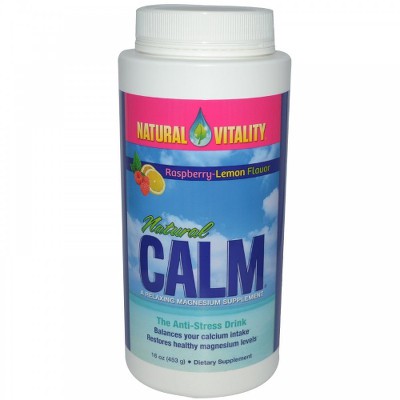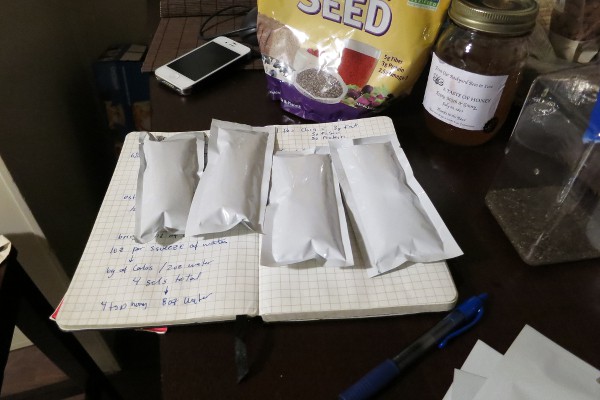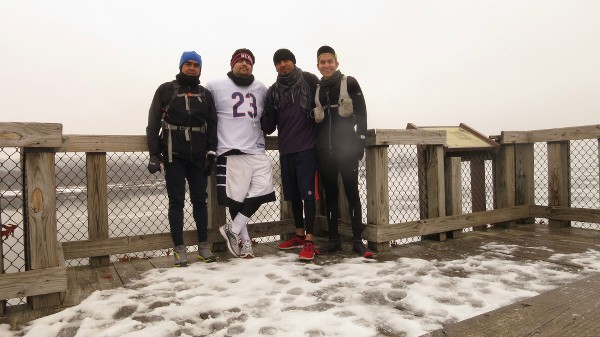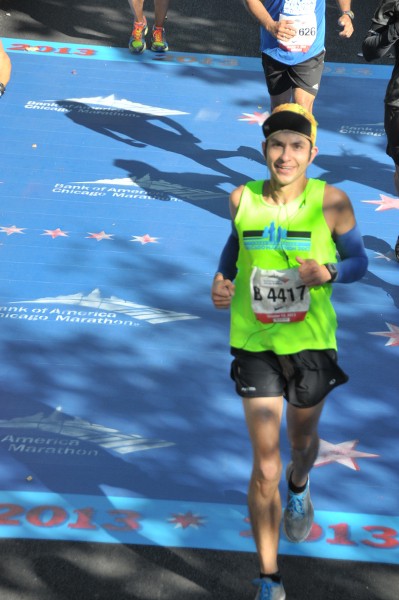Last year I published an article which discussed some of what I had learned throughout my admittedly short running "career", the article continues to be one of the first I recommend to friends new to running as well as those new to minimalist running. That article published here includes discussion on: minimalist running, proper footwear, MAF or aerobic training, and the importance of R&R (rest and rolling). If you haven't read that article I highly recommend you start there as my opinions on the topics presented has not changed much over the last few months and I believe all runners could gain from applying at least some of what is presented.
When I wrote that first article, I intended to quickly follow-up with a second part. This is the long-delayed follow up.
Nutrition and Supplements
Anyone who's sat around a meal with me in the last 6 months or so knows that my diet has morphed into one where healthy fats are a key component. My transition from a protein and carbohydrate heavy diet occurred as I learned about the MAF-style of training (training methodologies as taught by Dr. Phil Maffetone) that I discussed in the previous article. The basic premise is that to keep your body in a state where it is able to use it's own fat as a source of high-quality and readily available fuel you should eat a diet that is rich in healthy fats. I can't pretend to be an expert in nutrition but my general understanding is that since fat is processed and absorbed more slowly than carbohydrates they: limit the insulin response associated with the spike and crash in energy from a carbohydrate heavy meal; make people feel "full" longer; and encourage the body to fuel exercise with its own stores of fat (when training/racing at the right heart rate/pace).
Since the topic of nutrition is far too broad to cover as only part of a post, I'll simply add: eat real food, incorporate healthy fats and eat your veggies! Instead of digging into what I eat, I rather share a few of the supplements to my diet that I believe have significantly improved my training and racing.
These days I consistently use only 2-3 supplements. The first and what I consider the most important, especially when training volume or intensity picks up, is a magnesium supplement called Natural Calm. Magnesium is an essential mineral that cannot be produced by the body and must therefore come from either food or a supplement on a consistent basis. It is quite common for people to be deficient in magnesium. Among its uses in the body, magnesium is essential to the muscle and nerve function associated with athletic performance. Since magnesium is used during exercise and can be lost through sweat it, follows that endurance athletes are likely to be even more deficient in magnesium than the general population. It was after learning all of this that I decided that I would supplement my diet with magnesium. I wasn't sure if the magnesium would make a difference, but after doing my due diligence (I encourage you to do your own research, or consult your doctor) I decided it seemed safe and had enough of an upside that I should try it. What I noticed after starting magnesium supplementation was a very obvious effect (benefit), the twitchy feeling in my calves that would often occur on nights after a long run or hard workout faded. I could literally feel the magnesium working. Since the supplement is relatively cheap, seems to work, and has a big upside (performance, potential to reduce cramps, improved sleep) I have continued to take it. I will add that it is possible to get enough magnesium from diet: chia, almonds, pumpkin seeds and other nuts are great sources of it, so you may not be deficient, but if you have felt the calf twitchiness or struggle with cramps or exercise induced insomnia you might want to look into it.

The second supplement that has earned a spot on my shelf, well actually my fridge, is fish oil. About 6 months ago I decided to include fish oil into my regular routine in an attempt to increase the quantity of healthy fats I consumed. I know above I wrote "eat real food" and if I followed that statement diligently I wouldn't need to supplement with fish oil because I would be eating fatty cold water fish at least once or twice a week, but in practice I rarely cook fish and I decided that the price of a bottle of fish oil capsules was worth it for the potential benefits: reduced inflammation, quicker recovery, potentially improved cardiovascular efficiency, and potential to improve the bodies ability to use its own fat as a fuel source. Since I've started taking fish oil I do feel that I am recovering quicker and like I said it's not that expensive when considering the amount of time I am dedicating to running and racing.
My only word of caution with fish oil is to make sure you purchase a high quality fish oil in a triglyceride form instead of an ethyl ester form. As I understand it, the triglyceride version of fish oil is the naturally occurring form of the oil, the ethyl ester form is a modified version that is easier to produce, but research suggests that it may not be as readily processed by the body. Like a lot of research, the results are mixed but I figure if I have a choice between a naturally processed form of something and a synthetically processed form I might as well choose the natural form. If you aren't sure what form of fish oil you are purchasing, email the manufacturer and ask. I did just that for the bottles I've been purchasing and received a response confirming that the fish oil was in triglyceride form. Due to the positive response and great customer service I have been using Barlean's Organic Oils Fresh Catch Fish Oil exclusively over the last several months.
Race-day Fuel
When I first drafted this article last year I wrote a section on what was then my go-to race day nutritional combination, UCAN Superstarch and Roctane energy gels. Since writing that initial draft, I've modified my race day/hard or long-run nutrition by adding in a new element, a honey-water and chia mix that I have affectionately named RuGoo, after "Ru" the nickname my coworkers gave me years ago. I thought about replacing the whole section with a discussion on RuGoo, but then remembered that when I ran the Chicago Marathon last fall I still fueled with UCAN prior to the race, and still switched to Roctane for the race's final push, so I think it fair to include a discussion on all three sources of fuel.
On days I go out for a typical run of less than 1.5 hours I no longer carry any fuel or water. I believe my switch to MAF training and a diet high in healthy fats has adapted my body to be able to provide its own energy source, but on days I run longer than 1.5 hours, or on race day I do still use a few nutritional aides.
The first of these products is UCAN Superstarch. Catchy name aside, UCAN is basically a carbohydrate fuel source but unlike the typical sports drinks, gels, chews etc. UCAN is designed so that when consumed its impact on blood sugar is significantly reduced. Basically, UCAN takes non-GMO corn in a form similar to cornstarch and does some proprietary magic on the cornstarch to process it in a manner that slows its absorption by the body. In practice, this means that UCAN can help sustain energy levels over a longer period of time than your typical sports drinks and without the spike and crash that is common with most carbohydrate fuel sources. I'll say it again, do your own research and try it for yourself, but what I find with UCAN is that if I take two scoops of UCAN before a long run (2hrs+) or a race I feel a consistent energy base for the entire time. The UCAN seems to keep my body at an even level of performance for several hours without the crash or bonk. As with the fish oil and the magnesium, UCAN seems to improve performance and isn't too expensive (in bulk) so I plan to keep using it.
Here is where my nutritional plan for the beginning of last year and the end of last year diverged. After starting my race mornings with 2 scoops of UCAN and 2-3 fried eggs, I used to run most of the race popping a Roctane energy gel about every 3-4 miles. I knew that adding a highly concentrated carbohydrate (sugar) into my body seemed to work against the idea UCAN's slow glycemic burn, but had not found a better alternative; then came RuGoo. I listened to one of the masters of endurance training and performance, Phil Maffetone, speak on a few podcasts and heard him discuss his belief that the ideal fuel source for racing was a 6% carbohydrate solution. Phil translated the 6% solution as follows: 1 teaspoon of honey is approximately 6 grams of carbohydrates, and 3 ounces of water is approximately 100 mL, hence 1 teaspoon of honey into 3 ounces of water was his recommended fuel mixture. I took what I learned from Phil and modified his suggestion to include chia seed. My thought was since chia is a readily absorbed source of fat, protein and carbohydrate it would be a great addition to a custom gel or goo; especially since it forms a gel when mixed with water. Being the engineer dork that I am, I ended up borrowing a heatsealer from work and making all kinds of ratio calculations before individually sealing enough RuGoo packets for a trail race. I used the RuGoo, performed very well in the race, and felt great. Hence my new nutritional plan was born.

The following sections seem particularly relevant at this time year. Many people are taking up running for the first time, and many people who are already already runners are setting plans for the upcoming year. What follows is my advice which I feel is equally applicable to both groups.
Short-term Goals, Long-term Vision
Short-term: Pick a race, any distance 5K, 10K, 13.1mi, 26.2mi. Picking a race, signing up for it and circling the day on your calendar has the instant effect of adding extra purpose to your runs. Training for a race does not however have to be so serious that it takes the fun out of running. The key is to pick a race where the distance is a challenge and use the race as motivation to improve. Be careful to avoid becoming obsessed with the race, especially if it is your first, as it is easy to fall into the trap of prescribed training plans/schedules. It is ok to think about the race and ok to think about how to improve, but remember that even if running is how you pay the bills it's supposed to be fun. The commitment of signing up for a race can help quite a bit, especially on those mornings when your bed's gravity seems particularly hard to overcome. In addition to the motivational benefits of racing, there are the benefits of the camaraderie of being part of an event with a group of like-minded people and even a performance benefit on race day due to the extra excitement and adrenaline. I don't know if there have been scientific studies showing improved performance during races versus solo training runs, but I know that I have personally felt the benefits and have amazed with race-day performances.
Long-term: Whether you've already discovered the joy of running, or are closer to the couch than the 5K, I believe a great goal is to be running strong well into the Masters' Division (50 years+). I didn’t start running until I was 28, and now that I am a runner I have no intentions of stopping even after the digits in that age are reversed. Short-term goals like races or running a specific distance or time are great motivators, but they can also be blinding. One of the biggest mistakes I made was been getting too caught up in a target race, or a particular trail loop, or even an upcoming hill. When you are out running it is easy to get pulled into the moment, the endorphins and endocannabinoids are flowing and everything "feels" great. That feeling of strength that happens when you are out on a great run can be both one of the best parts of running and most dangerous. I have mostly been lucky, that even when I have pushed harder than I should have or I forced a run that did not feel quite right, I have avoided serious injury. However, my occasionally tender calves and feet can tell you how close I've come to serious strains or stress fractures.
Similarly, my initial transition from non-runner to runner happened much too quickly. The rush of feel-good chemicals released during every run and the increasing paces on my runs fed on themselves and I came dangerously close to causing serious damage. To this day I feel that the occasional twinge or tightness in my calves traces back to the damage/strain placed on it during the training for my first race. Like many others, I want to run more miles this week than last and more miles this year than last, but I've slowly gotten better at remembering that what I really want is to one day be racing alongside my kids. Considering that I don't have kids yet, I have plenty of time to slowly build up my speed and strength and I know I'll be happier at 82 if I do not destroy my body with injuries at 32. Lifelong running is an ultra-marathon and I intend to make it to the finish gracefully, not crawling. Learning about MAF running helped quite a bit with teaching me to run slower and more controlled. Instead of heading out trying to run faster every day I now try to run more efficiently every run and quite enjoy tracking the slow but steady improvements.
Trails, Trails, Trails!
If you aren't already making a trail run part of your running routine I highly recommend that you think about including trail running. Among its many benefits: trail running provides the opportunity to immerse yourself in nature; to explore parks and natural wonders you otherwise might ignore; to climb a mountain and literally look at a city from a new perspective; to scare wild animals much larger than yourself; and to laugh when an unseen squirrel scares the daylights out of you.
I feel trails bring new perspective to running: time seems to pass more quickly when my mind is engaged and life's problems seem to melt away. On the trail, I am reminded that I am part of the world; just another animal that loves to run.
A lot of times when I ask someone if they run trails the response is, "I would, but there are no trails around me", I don't buy it. I believe it's possible to find a trail, path, park, or non-road surface to run anywhere I visit. If I really have no idea where a trail may be, a Google search of "trail running ‘your city here’" always seems to provide some ideas. The other typical excuse is that the trails are too far away or otherwise inaccessible; again I disagree. I've managed to find trail heads using buses, bikes and cars and yes, occasionally the trip to the trailhead can take some time, but the reward for actually reaching the trail or even better running up the highest peak in a park more than makes up for the trip.
Another benefit of trail running is that it is easy to do with friends. Even when paces are very different among your group, trails tend to equalize pace and doubling back to regroup with your mates means that the faster members of the group get to enjoy each awesome view multiple times. Trails also provide a great opportunity to talk with your running buddies, and the typically available benches provide a great place to refuel before continuing the run.
Beyond the fun and scenery provided by running trails the physical benefits are also great. Running up hilly trails is like doing speed or strength work without the increased risk of injury that can come with running fast and after you've made it up a hard hill the descent provides a great opportunity to work on speeding leg turnover and helps strengthen your quads which will come in handy when your legs are fried around mile 21 of a road marathon. One last benefit I'll mention comes from the uneven terrain of trails which strengthens the supportive muscles and tendons of your legs something that the constant and repetitive motion of road running can neglect.
So, even if you're a hardcore road racer, and especially if you aren't, I emphatically suggest you leave the traffic, asphalt and noise of the city behind. Get lost on a trail and find yourself.

Stick With It, It Gets Easier
I think that most of us are capable of more than we believe, in life and in running. The first few days, weeks, or even months of running might not come easy; they likely won't. During those first few weeks, undiscovered muscles will be sore, your feet may ache, blisters may develop, and your lungs may burn from a seemingly short run. The easy way out is to quit; to decide that "I can't run" or "running just isn't for me". Don't quit. If you continue running, over time your body begins to catch up with your mind. You will begin to notice that runs feel easier, that your legs feel less tired the next day, and you'll hopefully figure out how to prevent those evil blisters (if not ask me, I can help). Running may initially seem impossibly hard, but if you don't give up you'll start to make noticeable improvement: you'll notice that you can run your usual loop in less time, your clothes will start to fit differently, you'll feel stronger and more alive. Just remember your progression should be slow to avoid burning out or getting injured. If you stick with it, running will become a joy, which brings me to my last thought...
Smile!
Running should be fun. Of course it's great that running makes us healthier, stronger, look and feel better, but I don't think any of those benefits should be your motivations. Run for the sake of running. Run because you like it. Run because it feels good. Remember, in running as in life there will be times when it feels too difficult to continue. It's in these moments that it's most important not to accept despair; dig deep and when you realize you have the strength to overcome any rough situation, smile!

